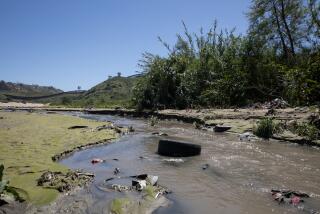Sewer Report Shocks Malibu City Backers
If Malibu incorporates, but does not approve a new sewer system, existing septic systems will continue to contribute to a health hazard in the area and could contaminate surface and ground water in the coastal community, according to an environmental study released this week.
Malibu cityhood backers were stunned by the findings in the draft environmental impact report, which they blasted for relying heavily on data provided by Los Angeles County, instead of information provided by the incorporation proponentsâ own experts, which concludes that the countyâs fears of pollution are exaggerated.
âOnce more we didnât get a fair shake,â said Walt Keller, co-chairman of the Malibu Committee for Incorporation. âEverything they said in the report was based on county documents. We gave them testimony from our experts, and they totally disregarded it.â
The court-ordered report is critical to the cityhood drive in the community, because it must be approved by the Local Agency Formation Commission before the panel votes on Malibuâs pending cityhood petition. However, since it is a draft report, Malibu residents will have a chance to challenge and perhaps add to the studyâs findings before it is approved by the commission, which handles all incorporation cases in the state.
The county recently approved a $43-million sewer system for Malibu, over the objections of incorporation proponents and other residents. County officials insisted that a sewer was required, based on staff studies that they say document a âsignificant health hazardâ in the beachside haven. The findings allowed the county to impose a sewer system without a vote by the community.
Cityhood advocates hoped to place the incorporation issue before voters in November and wrest control over sewage from the county before the new system was in place. In the absence of sewers, large commercial projects cannot be built in Malibu, despite several applications from developers. Sewer opponents say they want to preserve the rural character of the area.
The Malibu Township Council and the California Coastal Commission have filed lawsuits challenging the legitimacy of the county sewer plan, and hearings on the suits will begin in May.
Ordered by Court
A Los Angeles Superior Court judge ordered the environmental report shortly after the commission approved Malibuâs cityhood petition last August. The $19,000 study was prepared by Environmental Science Associates Inc., an environmental consulting firm. A public hearing on the draft is scheduled April 26.
Although the report mirrored the countyâs finding of a health hazard, it did say that a new city of Malibu could find ways to replace failing septic tanks and would have the authority to enforce new regulations governing their operation. The study also questioned some of the countyâs figures on failing septic tanks, saying that the number of properties with malfunctioning systems âmay be less than reported by the county.â
Still, the million-dollar beachfront properties in the Malibu Colony, the Civic Centerâs business district and landslide-plagued areas such as Big Rock Mesa should be served by an off-site sewer system, the report concluded.
The beachfront properties suffer constant damage to their septic tanks from storms, and leaking on-site sewage systems contribute to hillside instability, according to the report. Septic tanks are inadequate for dense commercial and residential use, the study found.
Primary Means
The study concluded that without a sewer system, with or without incorporation, the continued reliance on septic systems in Malibu as the primary means of waste water treatment âmay result in the continued endangerment of the environment.â
In one conclusion supporting the views of cityhood advocates, the report said that if Malibu incorporates without a sewer system, growth would be restricted, âprimarily because of the inability of septic systems to handle waste water capacity generated by the level of development that could otherwise occur with a sewer system.â
In addition, the report said, if the 20-square-mile coastal area does not incorporate and does not install a sewer system, continued haphazard or âdispersedâ development would likely occur.
More to Read
Sign up for Essential California
The most important California stories and recommendations in your inbox every morning.
You may occasionally receive promotional content from the Los Angeles Times.










